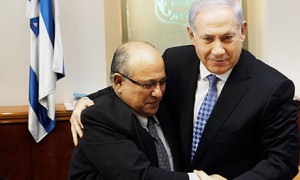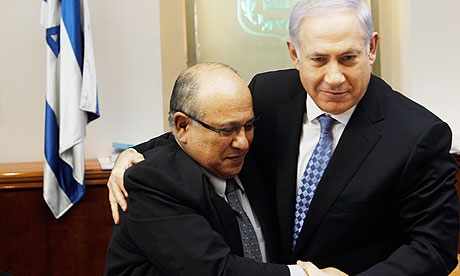The�series of assassinations of Iranian nuclear scientists�since 2010 has long been believed to be the work of the Israeli intelligence agency, the Mossad, but most of the speculation over the issue suggested that the Israelis sub-contracted the dirty work to Iranian rebel groups like the Mujahedin-e-Khalq (MEK) or Jundullah.

A new book by respected Israeli and American journalists called�Spies Against Armageddon�says the Mossad would never have farmed out the job to outsiders. The killings of the four scientists and the attempted murder of a fifth, were "blue and white" operations, the Mossad parlance for Israeli.
[F]or such a sensitive, dangerous, and daring mission as a series assassinations in�Iran's capital, the Mossad would not depend on hired-guns mercenaries. They would be considered far less trustworthy, and there was hardly any chance that the Mossad would reveal to non-Israelis some of its assassination unit's best methods.
The Mossad unit carrying out the assassinations is called Kidon, or Bayonet, which was infiltrated into the country by various routes
The Mossad also enjoyed fairly safe passage in and out of Iran by going through nations where the security services were cooperative � including the Kurdish autonomous zone of northern Iraq...Obviously, Israeli operatives travelled using the passports of other countries, including both bogus and genuine documents. ...In addition, the Mossad continuously maintained safe houses in Iran, dating back to the pre-1979 years under the Shah. That was an investment in the future, typical for Israeli intelligence.
The authors, Yossi Melman and Dan Raviv, also have more detail than I have seen anywhere else on Mossad efforts to smear Mohamed ElBaradei, the former director general of the International Atomic Energy Agency (IAEA). It fed suggestions he was in the Iranians' pocket to the Mubarak regime, to little effect, so it dreamed up other dirty tricks.
One such plan was to penetrate his bank account and deposit money there that he would not be able to explain. The psychological warfare department then would spread rumours to journalists that ElBaradei was receiving bribes from Iranian agents. In the end, that did not occur.
These assertions, like most of the claims in the book, are not backed up by quotes, even anonymous ones, or by any other kinds of references. The style of the book is to state such things as facts and we have to take it or leave it. Raviv refers to the style, also used by Bob Woodward, as 'synthesis'. The grounds for the claims are largely the reputations of the authors. Melman, in particular, is a doyen of Israeli national security experts, until recently on the liberal Ha'aretz newspaper, and is widely respected. My guess from reading it that the former Mossad boss, Meir Dagan, is a primary source.
Still, there are a lot of blurry edges in the book. It implies that the blast in a missile base near Tehran in December 2011 which killed the godfather of the Iranian programme, Major General Hassan Moghadam, was the work of Mossad, but Melman conceded this was purely supposition. There are also a lot of references to Iranian weaponisation work in the present tense, though all the evidence presented points to past activity.
Just as interesting as the claims about Mossad's activities in Iran is the way the authors refer to�Israel's own nuclear programme. Under Israel's policy of ambiguity, Israeli journalists are not supposed to confirm the existence of the arsenal, and every time they refer to it they have to add a formulaic phrase like 'according to foreign reports' or some such. In 'Spies Against Armageddon', there is some token effort at euphemism. For example, in the following section, the word 'potential' stands in for 'bombs':
Generating electricity without relying on imported coal and oil could be valuable, but developing a nuclear potential was even more important: It would make Israel an unrivalled force in the Middle East. It could be the ultimate guarantee of the Jewish state's continued existence.
But in the following passages, the taboo is tosed out altogether:
Implicit in Ben-Gurion's vision was an Israeli monopoly. Wherever and whenever deemed necessary, Israel would do what was necessary to be the only nuclear-armed power in the Middle East. That unique and unspoken mission would be at the core of crises more than half a century later..
Most of the prime minister's scientific advisers also feared that Israel could trigger a dangerous nuclear arms race. They loved research, but not weaponry. Seven of the eight IAEC members resigned in protest in late 1957.
Avner Cohen, author of�The Worst-Kept Secret: Israel's Bargain with the Bomb�drove a large bulldozer through the policy of deliberate ambiguity, oramimut, and Spies Against Armageddon appear to have benefited from the lighter censorship.
Raviv said that the entire text was submitted to the Israeli military censor and approved with only very minor amendments. I understand, however, that in the Hebrew version of the book, the usual formula of 'according to foreign sources' will be reintroduced.
From the outside it seems a bizarre and arbitrary practice, but the government shows no signs of abandoning it. A former deputy Mossad chief, Ilan Mizrahi, was in London yesterday and I asked him about it. He said: "Yes I think�amimut�is corroding, but I still think it is a good policy."
The Iran Project is not responsible for the content of quoted articles.











